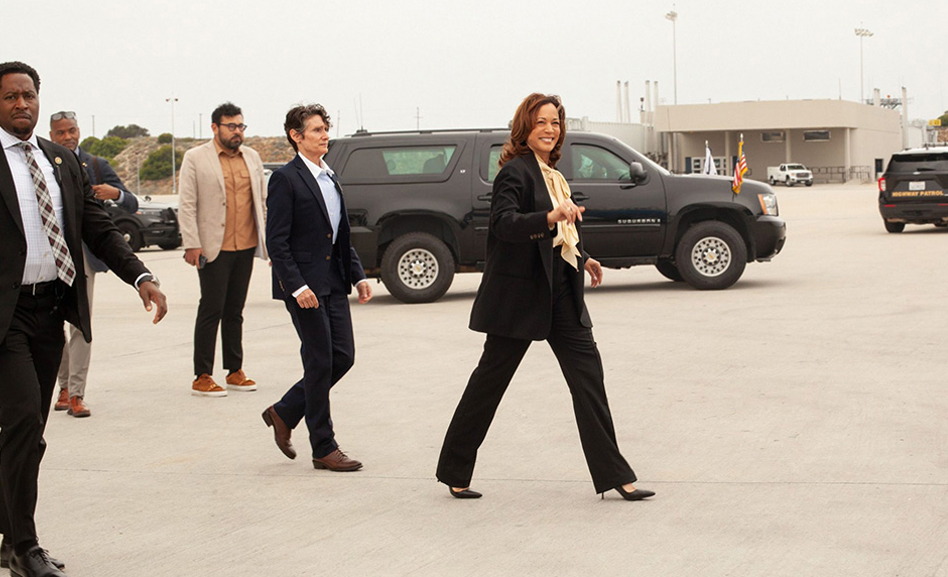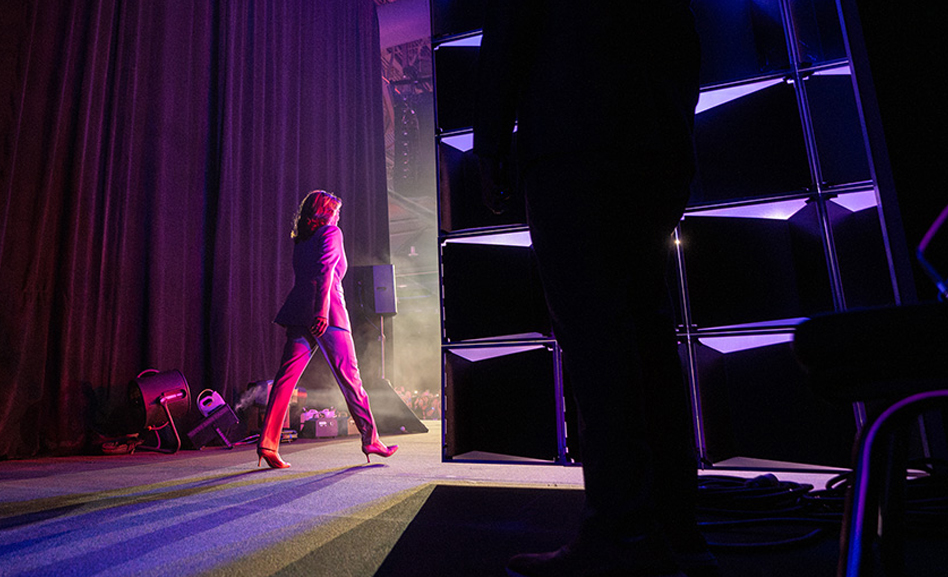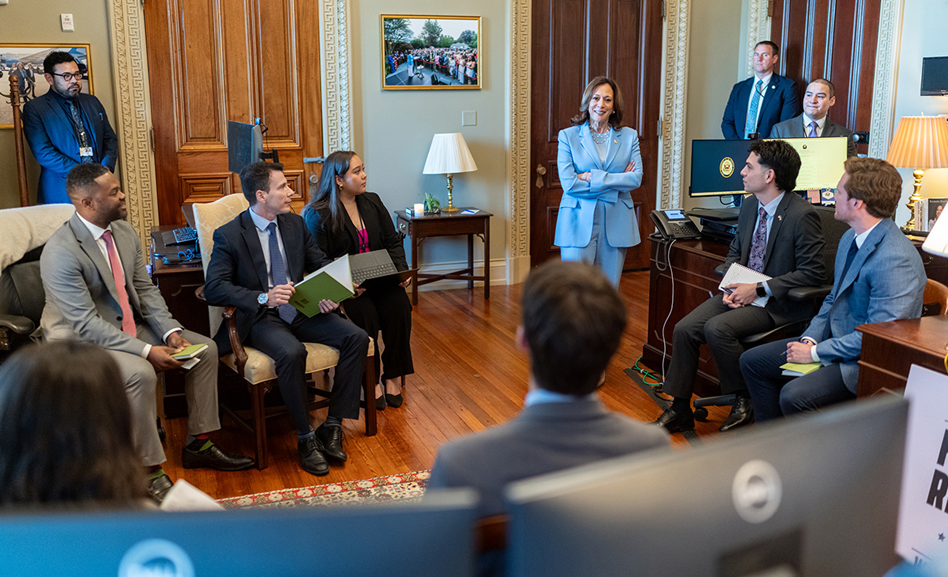
Vice President Kamala Harris (Washington Blade photo by Jono Madison)
Vice President Kamala Harris details what’s at stake when Americans go to the polls in November
CHRISTOPHER KANE | Washington Blade
Reprinted here courtesy of the National LGBT Media Association
Vice President Kamala Harris spoke with the Washington Blade by phone on Monday, June 3, for an exclusive interview in which she outlined the stakes of November’s election for LGBTQ communities and all Americans who are now facing “a profound, unapologetic and intentional movement to restrict rights.”
The conversation comes at the outset of the Biden-Harris campaign’s roll-out of an aggressive organizing and paid media push for Pride month, which will feature appearances at more than 200 events in June as part of an effort to mobilize LGBTQ and “equality voters” in key battleground states.
Thirty-nine percent of survey respondents in a 2022 poll by the Human Rights Campaign said they consider LGBTQ equality a “make or break” issue, and queer Americans, who comprise a larger share of the electorate than ever before, are considered critical for the president and vice president’s reelection effort.
Harris stressed that these constituents are not monolithic. “What is important to me,” she said, “is that I am in the community where those voters may be, in addition to every other community where I’m listening to their priorities and needs and then being responsive to that.”
America’s first woman, first Black and first South Asian vice president, Harris, 59, has broken barriers throughout her career in public service, beginning with her election as San Francisco district attorney in 2003, then as California attorney general in 2010 and as U.S. senator for California in 2016.
Harris has also been credited with playing a major role in the establishment and expansion of rights and protections for LGBTQ communities at the local, state and federal levels over the past two decades.
Along with the election, she addressed subjects ranging from the need to protect queer spaces to her relationships with LGBTQ staff over the years and the trajectory of the queer and civil rights movements in America.
Preventing hate violence
Last June, the Biden-Harris administration established an interagency LGBTQ+ Community Safety Partnership to confront the spike in hate crimes and bias-motivated violence against the community. (The White House introduced new CSP resources on Friday, May 31.)
Nearly a year later, the FBI and U.S. Department of Homeland Security issued a joint public service announcement about the risk of terrorism at Pride events and venues this month — and Harris told the Blade she is “very concerned” by the agencies’ warning.
This is familiar terrain for the vice president, who in September was tapped to lead the first-ever White House Office of Gun Violence Prevention and who noted that she was responsible for compiling and publishing hate crimes reports and for prosecuting “hate crimes against members of the LGBTQ community” when running the country’s second largest department of justice and serving as district attorney.
Bias-motivated crime targeting queer people “is not a new phenomenon, sadly, but it is growing,” she said, “I think in large part because of the powerful voices that are fanning the flames of hate. It is outrageous.
“What it does is it creates fear in the community, not to mention the possibility of real and serious harm, including crimes of violence,” she said.
Harris highlighted that issues of safety are among the major priorities for LGBTQ communities and equality voters, pointing to the June 2016 Pulse nightclub shooting in Orlando and the November 2022 Club Q shooting in Colorado Springs, crimes that she said the country must never forget.
“Gun violence,” when “being used because of hate” can “destroy the lives of so many innocent people,” she said, adding, “we know that for so many in the LGBTQ community, those clubs are the only place that a lot of people can go in certain communities to just have joy and [to] feel safe having joy, and now those places have been targeted.”

Vice President Kamala Harris (Washington Blade photo by Jono Madison)
Marriage, LGBTQ families, and the movement to restrict rights
In 2004, when 61 percent of Americans opposed the legal recognition of same-sex marriages (per Gallup), then-district attorney Harris officiated some of the first weddings between gay and lesbian couples in defiance of state and federal regulations.
Later, as attorney general, she refused to defend Proposition 8 and petitioned the U.S. Court of Appeals for the 9th Circuit to repeal the ballot measure, which had amended the state’s constitution to recognize only opposite-sex unions between one man and one woman.
Of the roughly two-dozen Democrats who led major presidential campaigns in 2020, Harris boasted the earliest explicit on-record support for marriage equality — by a long shot. However, even though virtually every elected Democrat and the majority of the American people have since come around on the issue, today the vice president is deeply troubled by the observation that “for the first time, we are seeing a profound, unapologetic and intentional movement to restrict rights.”
At the nexus of these threats to the rights of LGBTQ Americans and other communities, Harris said, is Donald Trump and his right-wing extremist allies.
“Look at what he has done with the United States Supreme Court and the justices that he chose,” she said, “including the Trump-selected justices, who ruled last year that small businesses can discriminate against LGBTQ people” in 303 Creative LLC v. Elenis.
“And listen, I do believe that if reelected, he would appoint more conservative judges — and you see where this is heading,” Harris warned.
Shortly after Trump sent three right-wing justices to the U.S. Supreme Court, its conservative supermajority overturned Roe v. Wade (1973), revoking constitutional protections for abortion that had been in place for nearly 50 years.
With that decision, in Dobbs v. Jackson Women’s Health Organization (2022), “the highest court in our land took a fundamental freedom from the people of America, especially the women of America,” Harris stressed. “Understand what that means in terms of how that weakens our country for everyone. America has always prided itself on the fact that our strength and the growth of our strength is based on an expansion of rights.”
She noted Clarence Thomas’s issuance of a concurring opinion in Dobbs in which he expressed interest in revisiting other precedent-setting cases like Obergefell v. Hodges (2015), which established the right to marriage equality nationwide. (In response, President Joe Biden and congressional Democrats led passage of the Respect for Marriage Act, which codified into federal law many of the legal rights held by married same-sex and interracial couples.)
Meanwhile, conservative jurists across the country, many appointed by Trump, have taken aim at other freedoms including access to contraception, medication abortion and in-vitro fertilization, which has been met with pushback from the Biden-Harris administration via regulatory action and litigation.
Harris pointed out that “the hypocrisy abounds” provided that “on the one hand, you’re saying that we’re going to prevent you from ending an unwanted pregnancy” and “on the other hand, we’re going to prevent you from starting a family.”
“We know that for LGBTQ couples, IVF is one of the most critical and essential ways that they can start the family they dream to have,” the vice president said. “And the idea that access to IVF would be at stake, at risk, much less denied, means to deny loving couples,” same-sex and opposite-sex alike, “the ability to start a family.”
More broadly, she added, “let’s just think about the various civil rights movements that the community has been involved with, and where the rights of LGBTQ people have been at stake, including the successful movement that we had for the freedom of people to love who they love openly and with pride and to have that love recognized by law if they want to marry and choose to marry.
“Freedom, the concept of freedom, has always been an undergird of the movement for LGBTQ equality and rights,” Harris said.
The need to stay vigilant and engaged
Across the board, Harris said, “the range of [issues] we’ve already discussed are priority, right? So everything from the fear of violence and hate, what we need to do to continue to be vigilant to protect the gains we’ve already made around equality, but [also] ensure that we also fight against those who are trying to erode the progress that we have achieved here, on LGBTQ rights, specifically.”
Harris noted that there are “a variety of other issues that include, for example, discrimination in housing. I’m doing a lot of work on that in affordable housing, but in speaking of discrimination in housing, we know that part of the history of the discrimination against members of LGBTQ community includes that issue.”
There is also a need to shore up protections for teachers and students, she said, “especially when we look at a state like Florida that has a ‘don’t say gay’ law, and what that means for LGBTQ teachers in one of the most populous states in the country.”
The past few years have seen a deluge of anti-LGBTQ laws proposed (and passed, in many cases) by conservative state legislatures across the country, Harris noted. The ACLU is tracking 515 so far in 2024. Disproportionately, these bills target the rights of trans and gender expansive Americans, especially youth.
The vice president pointed to Iowa’s Religious Freedom Restoration Act, signed by Republican Gov. Kim Reynolds in April. Opponents and LGBTQ advocates argue the law’s primary aim is to provide a pretext and legal cover for discrimination against queer Iowans.
Harris also noted the prevalence of book bans, a substantial percentage of which target titles with LGBTQ characters and themes. (Last June, the White House appointed a coordinator at the U.S. Department of Education’s Office for Civil Rights to provide training for schools on “how book bans that target specific communities and create a hostile school environment may violate federal civil rights laws.”)
The vice president emphasized, “You look at the election cycle, and yes, it’s about Trump,” but there are also “anti-LGBTQ extremists running in down-ballot [races] across the country,” including North Carolina gubernatorial candidate and current Lieutenant Gov. Mark Robinson, a Republican, “who refers to LGBTQ people as filth.” The White House issued a statement calling his June 2021 remarks “repugnant and offensive.”
Emphasizing the contrast to win in November
“Joe Biden and I are very proud to be the most pro-LGBTQ administration in history,” Harris said, “and I think that on the other side of this equation in November, you’ve probably got one of the most anti-LGBTQ administrations in modern history.”
“I am an eternal optimist and I’m also a realist,” Harris said. “When we fight for our rights, we see progress — and we win. We have to be vigilant, though. We have to see what’s possible and then fight to get there, like passing the Equality Act,” legislation championed by the Biden-Harris administration that would prohibit discrimination on the basis of sexual orientation and gender identity in areas from housing and employment to lending and education.
“We’ve got to participate to get the Equality Act and things like that passed,” Harris said, adding, “I’m also clear-eyed” about “what’s happening on the other side of the ledger,” which means taking “seriously that these extremists are making their intentions clear, and we should take them at their word.”
Along with her experience growing up in the Bay Area, “which, proudly, was on the front lines of the gay liberation movement,” Harris said her perspective and approach have been influenced to a significant extent by LGBTQ leaders she has worked with over the years, including her first campaign manager, Jim Rivaldo, who had previously advised Harvey Milk in the history-making 1977 election in which he became the first openly gay man to hold public office in California.
“I grew up in politics believing in the coalition,” Harris said, “that no one should be made to fight alone. We all stand together in the fight for freedom and equality and civil rights, and so let’s balance out how we think about all of this stuff. We know what we stand for, so we know what to fight for, and therefore we will win.”

Vice President Kamala Harris and staff (White House courtesy photo)
Harris puts LGBTQ people in positions of power
The Biden-Harris administration has appointed LGBTQ leaders throughout the federal government in record-breaking numbers, with high-profile examples including Transportation Secretary Pete Buttigieg, White House Press Secretary Karine Jean-Pierre and Adm. Rachel Levine, assistant secretary for health at the U.S. Department of Health and Human Services.
Likewise, many of the top deputies serving in the office of the vice president are LGBTQ — as were a number of Harris’s closest and highest-ranking advisers from the time she was district attorney through her tenure as U.S. senator.
“Every elected position I have had involves making decisions that will impact, invariably, hundreds of thousands to over hundreds of millions of people,” she said, and “I feel very strongly that decision-making” should “reflect the communities we are serving.”
“I want to have input and perspective from a diverse group of people who will have a diverse set of life experiences and perspectives that will help inform a good decision on my part,” Harris said.
On May 22, the Blade was invited to attend a meeting in which the vice president addressed members of her staff in the Eisenhower Executive Office Building ahead of Pride month.
“Increasingly,” Harris said, “it takes on a different meaning depending on what’s happening in the world, and while we’ve seen so much progress, we’ve also seen a decline.
“There are a lot of people who are in pain, or afraid, who are being attacked or fear being attacked in many ways that might be physical,” or otherwise by “forces that are trying to demean and trying to separate people and create divisions,” she said.
At the same time, Harris emphasized, “we have great power, those of us who work in this place, to remind people that we stand with them. You all heard me say many times, I strongly believe no one should remain silent.
“We’re all in this together,” she said. “And there’s so much that’s been part of the movement for LGBTQ+ rights that has been about an acknowledgment of the strength of the coalition.”
The vice president recalled how she had to fight to display the Pride flag outside her Senate office. “I had to fight, well, you know the story,” she said, gesturing to some members of her staff, “and I was just like, ‘I’m doing it,’” adding, “I did it, of course.”
“I’m very proud of every one of you, OK?” Harris said. “Thank you for being a leader in so many ways.”

If you believe anything this woman says, then you are about as dumb as they come. The giggle queen only got this far because she spent most of her time on her knees. The first Affirmative Action Vice President!